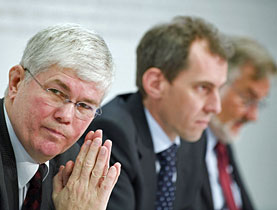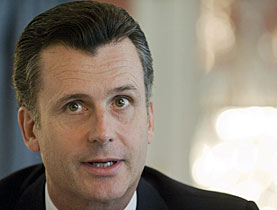Pay restrictions imposed on financial community

Switzerland's financial regulator will enforce new regulations on pay and bonuses for the country's largest banks and insurance companies from next year.
The rules demand a link between bonuses and long-term performance to reduce excessive risk taking. Companies will also be expected to be more transparent about remuneration policies to shareholders.
The Swiss Financial Market Supervisory Authority (Finma) presented its revised regulations on Wednesday that will come into effect on January 1, 2010. Switzerland is one of a handful of countries, including the Netherlands and France, to produce something concrete from months of global talks on the issue.
Leading financial institutions will now be obliged to prove that bonuses do not encourage the type of risky behaviour that has caused so much chaos in the last year. Variable pay should be held back for a number of years and would be reduced or forfeit in the case of poor results.
“Remuneration schemes can create false incentives which may lead to inappropriate risks being entered into, threatening the business and profitability of a financial institution and, at the end of the day, its stability,” Finma stated.
Companies will now have to prove that their total compensation schemes, including base pay and extra payments such as golden handshakes, do not compromise their overall stability.
Concessions made
Following a consultation period, the new rules have been watered down to apply only to the country’s seven biggest banks and five largest insurance companies. But Finma could impose the regulations on smaller institutions if deemed necessary.
Another concession Finma granted was allowing firms to appeal if foreign-based operations faced competitive disadvantage. This would most likely apply to the United States where big bonuses are back in fashion, and Swiss banks could lose out in the war for talent.
Finma spokesman Alain Bichsel argued that other countries were soon expected to follow suit with their own compensation restrictions. “We don’t want to harm the international activity of our big banks,” he told swissinfo.ch.
The Swiss Bankers Association said it was “satisfied” with the final regulations. “It is a positive sign that Finma did not give in to popular demands to impose a bonus cap,” spokesman Thomas Sutter told swissinfo.ch.
Hans Geiger, former professor of Zurich University’s Swiss Institute of Banking and Finance, believes the new rules may help Swiss banks in the long run.
“It makes sense for clients and shareholders to do more business in a country with a more secure system,” he told swissinfo.ch.
Not everyone is happy
However, other reaction was mixed. The Swiss Insurance Association said the sector had created stability rather than destruction during the financial crisis and had completely different risk principles to banks.
“It remains to be seen to what extent the changed guidelines impairs the international competiveness of our members,” President Erich Walser said in a statement.
Swiss entrepreneur Thomas Minder, who is behind a popular initiative to cap bonuses and increase the rights of shareholders, said the rules did not go far enough. Limiting pay to risk was dangerous as risk was subject to too many uncontrollable variables, he argued.
Credit Suisse had criticised the original proposals as going “too far in many areas and can therefore lead to competitive distortions”. Both it and UBS have recently restructured their compensation policies, but neither would comment on the finalised Finma rules.
Bichsel told swissinfo.ch that Finma would check in the new year to see if the banks’ changes had gone far enough.
Matthew Allen, swissinfo.ch
The enormous pay packets of leading bankers were called into question around the world following the financial crash that resulted in a global recession and massive job losses.
Last week, the finance ministers of the world’s leading 20 economies (G20) proposed deferring bonuses to make them dependent on long-term results.
They suggested paying bonuses entirely in shares or options and introducing claw back clauses to reduce or eliminate such payments. The ministers also urged greater transparency in the pay policies of financial institutions.
Calls from some countries to put a ceiling on bonuses were rejected by the G20.
Dutch banks on Wednesday signed up to a new voluntary code of conduct that caps bonuses to 100% of base pay and introduces claw-back schemes. Redundancy pay will also be limited to one year’s salary.
French banks have also agreed to reform staff compensation systems, while bonuses in Britain will be deferred for up to three years as of 2010.
Finma’s new rules on remuneration were presented to Switzerland’s financial institutions for consultation in June. The final version will come into force on January 1, 2010 but banks and insurance companies will be given a year to fit them into their corporate structure.
Swiss employment law may also have to change to account for the possibility of bonuses being decreased or forfeited. At present, employees are legally entitled to receive bonuses that have been awarded.
Swiss voters will in the near future still get the opportunity to have their say on a popular initiative that calls for a cap on bonuses and more power for shareholders to influence company remuneration schemes.

In compliance with the JTI standards
More: SWI swissinfo.ch certified by the Journalism Trust Initiative





You can find an overview of ongoing debates with our journalists here. Please join us!
If you want to start a conversation about a topic raised in this article or want to report factual errors, email us at english@swissinfo.ch.